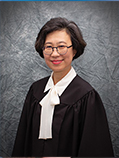This May, we’re recognizing diverse voices in the judiciary in honor of Asian American and Pacific Islander Heritage Month. The following features 16th Judicial Circuit Associate Judge Eun Yoon and her thoughts on her career, diversity, and more.

Hometown: Seoul, South Korea
College/Law School: Truman State University (Kirksville, MO)/DePaul College of Law (Chicago, IL)
District or Circuit: 16th
Circuit- Kane County
When did you know you wanted to pursue law, and eventually, become a judge?
My first job after college was a program host at Korea Broadcasting Inc., a local Korean American radio station in Chicago. Through this role, I learned about the hard-working lives of Korean Americans and how difficult it was for many to navigate legal issues. That experience inspired me to apply to law school with the goal of pursuing a career in public service. I went on to serve as an assistant public defender in Kane County for 21 years before my judicial appointment.
When you reflect on your career, what accomplishments are you most proud of?
I am proud to witness the incredible power of second chances in the courtroom. There are individuals who come to court struggling with substance abuse disorders, mental health challenges, and/or criminal records, yet they are determined to change and find a new path. It is an honor to encourage them as they work toward making changes in their lives.
What is a challenge you’ve had to overcome in your career?
One of the biggest challenges has been balancing work and family. I was married with two children and it was difficult to pursue my career while also being present for my family. I could not have done it without my supportive husband and children who took pride in having a full-time working mom -- even though I often missed the field trips and school activities.
Who is an AAPI figure who has influenced you?
Judge Divya Sarang is one of the first Asian American women judges in Kane County. Her guidance has been truly invaluable. I appreciate the emotional and motivational support she offered during the judicial application process and after the appointment. She has always made herself available to meet with me and answer my questions.
How has your heritage shaped who you are today?
As a Korean American, I consider myself very fortunate to be bilingual and immersed in two distinct cultures. This unique perspective has made me strive to be adaptable and insightful, personally and professionally. I learned the importance of respecting individualism while also valuing the strength of working together toward a common goal.
Why do you think it’s important to discuss and recognize diversity, both on the bench and in everyday life?
For me, recognizing and embracing diversity leads to better understanding and more effective communication. It brings different experiences, perspectives, and approaches to the table. As a judge, when I work with a wide range of courtroom participants and face a challenging situation, I try to assess each case from multiple points of view -- often considering factors such as neurodiversity and cultural difference. This helps ensure fairness and sensitivity in my decision making.
What is one of your favorite traditions or customs of your culture/family? (Ex. Food, Special Event, etc.)
One of my favorite traditions is sharing food -- especially side dishes or banchan. In Korean culture, mealtime is more than just eating; it’s a communal dining experience and social interaction. It is time to connect, share stories, and strengthen bonds with family and friends.